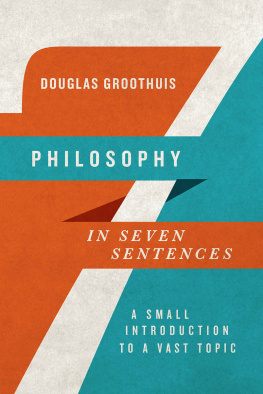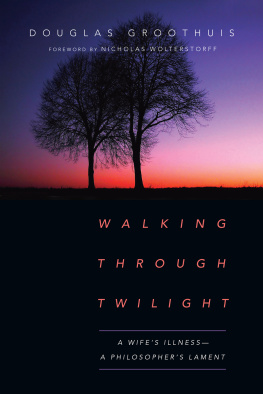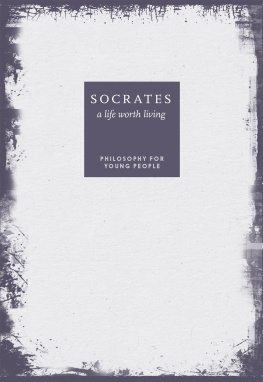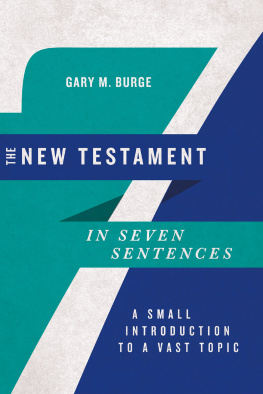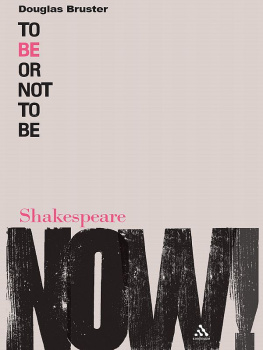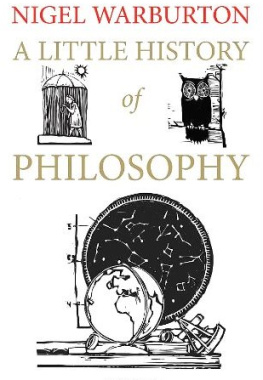PHILOSOPHY
IN SEVEN SENTENCES
A SMALL INTRODUCTION TO A VAST TOPIC
DOUGLAS GROOTHUIS

To Gordon R. Lewis,
PhD, Senior Professor, Denver Seminary,
whose contributions to Christian philosophy and Christian
theology for more than six decades have been a
godsend to the church and a challenge to
the unbelieving world
Contents
Preface
I nspiration is an odd beast, enlightening here and deceiving there. Inspiration sometimes comes through epiphany, seemingly out of nowhere and resplendent with originality and beauty. Some works of great music appear in this way. Friedrich Nietzsche wrote his anti-Gospel, Thus Spoke Zarathustra, in a fit of literary effusion lasting only two weeks. The result has baffled millions for a century.
Philosophy in Seven Sentences came into being rather quickly after a lifetime of engaging philosophy: after many discussions and arguments about philosophy, after three academic degrees in philosophy, after attending (too) many conferences about philosophy, after grading many papers about philosophy (both good and evil), after publishing much about philosophy, after changing some of my views on philosophy, and after sometimes questioning my own ability to do philosophy well.
I was inspired by recent popular books featuring numbers and objects in the titles, such as A History of the World in 100 Objects by Neil MacGregor, A History of the World in Six Glasses by Tom Standage, and The Smithsonians History of America in 101 Objects by Richard Kurin. My object for organizing and introducing philosophy was not a physical object but an object of thought: a sentence. The number seven seemed right, given the alliteration and because I was drawn to just these philosophically pregnant sentences. My hope is that the book will introduce the beginner to the craft of philosophy. A seasoned reader might find ideas worth consulting afresh or even for the first time.
Philosophy is a many-splendored discipline. Miniature books, such as this, must fail to lasso everything and will leave many critters hurdling about in the pasture, unnamed and unattended. To talk shop, Philosophy in Seven Sentences is most concerned with epistemology (how and what we can know) and metaphysics (the study of being). Travelers through the book will also read a bit about moral philosophy and aesthetics.
Philosophers have biographies, although their philosophies are not limited to their biographies. So, each chapter includes a bit of their stories. (A few of my stories appear as well.) Since philosophers argue and agree with other philosophers, I consider their intellectual relationship with others in the guild, particularly those philosophers whose sentences we engage. Dialogue and debate down through the ages is the conversation of philosophy. Overhearing it may spark truth in our souls or at least clear away some errors of thought.
I do not take up theology directly, but each of the seven sentences bears on questions concerning God, the universe and humanity. I am not sure why anyone would be interested in philosophy otherwise.
I have many to thank, but room for only a few. Jason Crowder found references for Augustine and Pascal that eluded me (to my shame). My colleague Sarah Geis gave excellent commentary on Descartes. Elizabeth Johnson contributed some dandy editing. Rebecca Merrill Groothuis prayed for this book project, as she has for all my other ones. Thanks also to the administration of Denver Seminary for granting me a sabbatical during which much of this work was done.
Introduction
Philosophy in Only Seven Sentences?
C an we tackle some of the key questions and answers in philosophy through just seven sentences by seven famous philosophers? I wager we can; so we will. Many other sentencesor paragraphs or bookscould have made the cut. Because of this, some will argue that my selection was biased, ignorant or slanted. If so, let them philosophize over it. After all, that is the purpose of this book: to think and act philosophically.
I make no claim that Philosophy in Seven Sentences is representative of philosophy as a whole. I chose these authors and their sentences for several reasons. First, I was familiar with them. As I point out several times, many of these ideas have deep autobiographical significance to me. Second, they raise issues pertinent to our day. Third, each sentence is fairly well known; none is esoteric.
Some may think that popular philosophy is an oxymoron, a silly contradiction not worthy of a moments thought. Philosophy is, of course, for expertsthose who have accumulated vast student-loan debts, after which they have logged long and lonely years in the classroom, studying at their desks, and arguing with other philosophers about philosophy. These strange souls are abstruse, esoteric, recondite and many other long, pompous words not meant for the masses. Philosophers write for each other, argue with each other and often flummox or bore the hapless college students whose academic requirements put them in their presence.
And so it is for many philosophers, but not for all of them. At its most ancient root, philosophy was meant to initiate us into the good life, to tutor us for the ongoing experience of knowledge and virtue. Since everyone lives some kind of life, philosophy explored the minds abilities to live life in accord with reality. At best, it helps scratch the itch of human existenceor, at its worst, it rubs the wound raw. Even though etymology (the study of word origins) may deceive, it does its work well in understanding the origin of philosophy, telling us that its two Greek parts are love (philos) and wisdom (sophos). Philosophers may not always love wisdom, but that is their disciplines pedigree. The Hebrew Bible warns in the book of Proverbs that both wisdom and folly call out for reflection and allegiance. The wise are diligent in learning, facing the facts in earnest, while the fool sacrifices character for ignorance and untutored pleasure. But knowledge beckons, nevertheless, at least in our better moments. As Aristotle wrote, All men by nature desire to know. (We will examine this sentence shortly.)
Any thinking person may join philosophys discussion, which rings down through the ages. That is the aim of this small book, which, I hope, can be read profitably by both philosophical neophytes and seasoned philosophers, whatever their worldview may be. My aims are catholic (universal), however parochial my selections may seem to some.
Philosophy is not a closed club or a secret society. Since we all can think about ultimate questions, lets do it. For the record, I propose that the requirements for being a philosopher (whether good or bad, major or minor, professional or layperson) are a strong and lived-out inclination to pursue truth through the rigorous use of human reasoning, and to do so with some intellectual facility. But, sadly, even some philosophers disavow the search for truth. In Whats the Use of Truth? French philosopher Pascal Engel writes, There is... no obligation to say or to believe that which is true. If so, why should we read his writings or those of any other philosopher?
Is then everyone a philosopher? Everyone muses a bit on where we came from, who we are and where we are going. But not all do this very well. So, while Johnny Rotten (b. 1956) of the Sex Pistols addressed some philosophical themes in his punk rock compositions and performances, one is reluctant to give him the title of philosopher. This is because it is a kind of merit badge, reserved for the few. I was recently asked by a precocious ten-year-old named Liam if I was a philosopher. I said I was. Then he asked, What do you do? My reply was, I think a lot about arguments. We then discussed the nature of an argument. With a little coaxing he told me what an argument was: giving reasons for what you believe, often in conversations with those who believe otherwise. I have recruited him for graduate study in my program.

